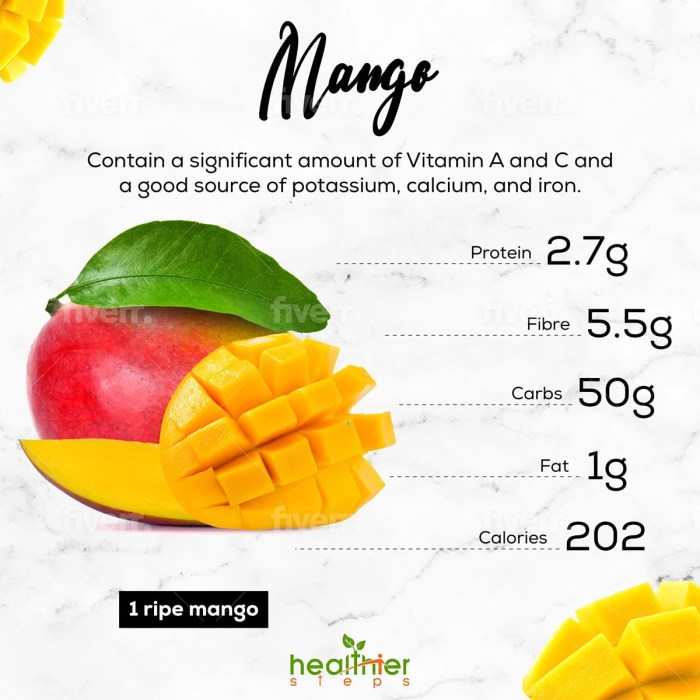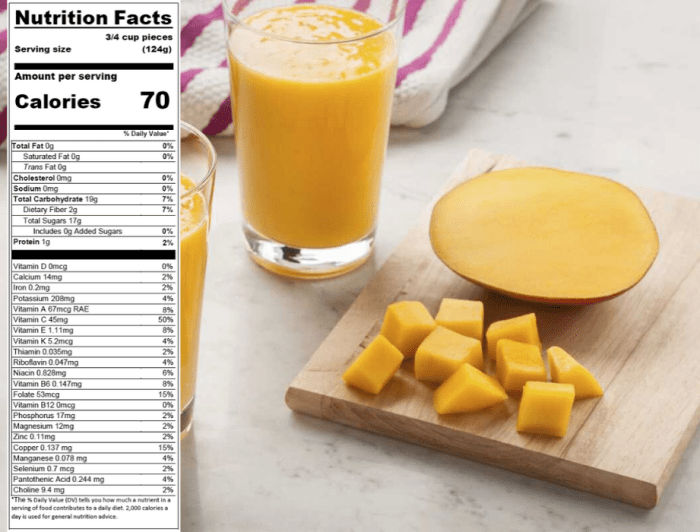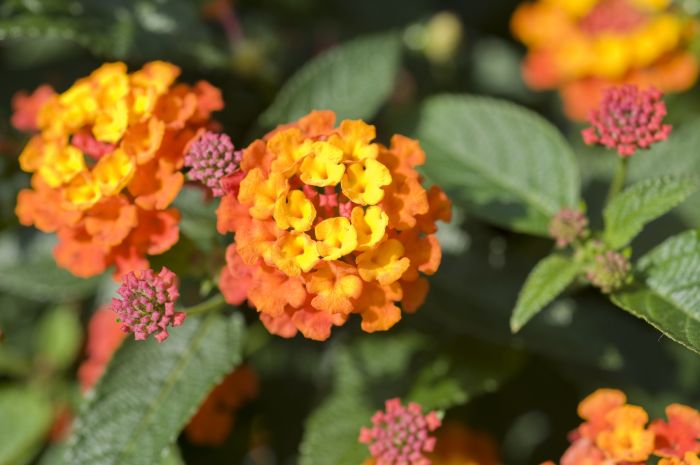Vitamins and Minerals in Dried Mango

Dried mango nutrition facts – Dried mango, a popular snack enjoyed worldwide, offers a surprisingly rich profile of essential vitamins and minerals. While the drying process concentrates sugars, it also retains a significant portion of the fruit’s nutritional value. Understanding the specific vitamins and minerals present and their associated health benefits is crucial for incorporating dried mango into a balanced diet. This section details the key nutrients found in dried mango, their roles in the body, and the potential benefits and risks associated with consumption.
Key Vitamins and Minerals in Dried Mango and Their Health Benefits
Dried mango is a good source of several essential vitamins and minerals that contribute to overall health and well-being. These nutrients play vital roles in various bodily functions, and their presence in dried mango offers a convenient way to boost intake.
- Vitamin A: Crucial for vision, immune function, and cell growth. Dried mango provides a significant amount of Vitamin A, contributing to maintaining healthy eyesight and a robust immune system. A deficiency in Vitamin A can lead to night blindness and impaired immune response.
- Vitamin C: A powerful antioxidant that protects cells from damage caused by free radicals. Vitamin C also plays a vital role in collagen synthesis, wound healing, and iron absorption. The high Vitamin C content in dried mango supports the body’s natural defense mechanisms and contributes to healthy skin and tissue repair.
- Vitamin K: Essential for blood clotting and bone health. Vitamin K aids in the process of blood coagulation, preventing excessive bleeding, and contributes to strong bones by promoting calcium absorption.
- Potassium: An important electrolyte that helps regulate fluid balance, blood pressure, and muscle contractions. Dried mango’s potassium content supports healthy blood pressure levels and proper muscle function. Potassium deficiency can lead to muscle weakness and irregular heartbeats.
- Copper: Involved in energy production, iron metabolism, and the formation of red blood cells. Copper is a crucial component of several enzymes involved in various metabolic processes. Adequate copper intake is essential for energy levels and healthy blood production.
Recommended Daily Intake vs. Dried Mango Content
While the exact amount of vitamins and minerals in dried mango can vary depending on factors such as the variety of mango and drying methods, a typical serving (approximately 1/4 cup or 30 grams) contains a notable amount of these nutrients. It’s important to note that recommended daily intakes (RDIs) vary depending on age, sex, and overall health. Consulting a healthcare professional or registered dietitian is recommended for personalized dietary advice.
For example, a 1/4 cup serving of dried mango may provide a significant percentage of the RDI for Vitamin A, but only a smaller percentage of the RDI for Vitamin C. Comparing the nutrient content of dried mango to the RDI helps individuals assess whether it contributes significantly to their daily nutrient needs.
Potential Health Risks of Excessive Dried Mango Consumption
Despite its nutritional benefits, excessive consumption of dried mango can pose some health risks primarily due to its high sugar content. Dried mangoes have a much higher concentration of sugar compared to fresh mangoes because the water content has been removed during the drying process. Consuming large quantities can lead to weight gain, increased blood sugar levels (particularly concerning for individuals with diabetes), and potential dental problems due to increased sugar exposure.
Dried mangoes, bursting with sunshine-yellow sweetness, offer a potent dose of vitamins and fiber. However, for a different nutritional profile, packed with protein and iron, you might consider checking out the ny strip steak nutrition facts ; then, you can compare that rich, savory profile to the bright, fruity sweetness of dried mangoes and choose what best suits your dietary needs.
Dried mangoes remain a vibrant, convenient source of natural sugars and essential nutrients.
Furthermore, excessive intake of specific vitamins and minerals, such as Vitamin A, can lead to toxicity in some cases. Therefore, moderation is key to reaping the benefits of dried mango without compromising overall health. For instance, consuming more than two servings per day could lead to an excess of sugar and potential vitamin A toxicity in some individuals.
Always practice moderation in consumption to minimize potential risks.
Dried Mango and Health Benefits

Dried mango, a concentrated source of nutrients, offers a range of potential health benefits beyond its delicious taste. Its high concentration of vitamins, minerals, and antioxidants contributes to its positive impact on various aspects of well-being. The following sections delve into the specific advantages of incorporating dried mango into a healthy diet.
Dried mango boasts a compelling nutritional profile, making it a valuable addition to a balanced diet. Its concentrated nature means that a small serving packs a significant punch of vitamins, minerals, and fiber. This makes it a convenient and effective way to boost nutrient intake.
Potential Health Benefits of Dried Mango Consumption
The nutritional richness of dried mango translates into several potential health benefits. These advantages stem from its high concentration of essential vitamins, minerals, and dietary fiber.
- Improved Digestive Health: The high fiber content in dried mango promotes regular bowel movements and aids in preventing constipation. Fiber also supports a healthy gut microbiome, crucial for overall digestive well-being.
- Boosted Immunity: Dried mango’s abundance of Vitamin C, a potent antioxidant, strengthens the immune system, helping the body fight off infections and illnesses. Other immune-boosting nutrients contribute to this effect.
- Increased Energy Levels: The natural sugars and carbohydrates in dried mango provide a readily available source of energy. This can be particularly beneficial for individuals needing a quick energy boost, although moderation is key to avoid blood sugar spikes.
The Role of Antioxidants in Dried Mango
Dried mango is a significant source of antioxidants, particularly carotenoids and Vitamin C. These compounds combat oxidative stress, a process linked to various health problems including chronic diseases and premature aging. Antioxidants neutralize harmful free radicals, protecting cells from damage.
The high antioxidant content in dried mango contributes to its potential protective effects against various diseases. Studies have shown a correlation between high antioxidant intake and reduced risk of chronic illnesses, although more research is needed to establish definitive causal links. For example, the presence of beta-carotene, a precursor to Vitamin A, supports eye health and may play a role in reducing the risk of age-related macular degeneration.
Dried Mango and Specific Health Conditions or Target Audiences, Dried mango nutrition facts
While not a cure-all, dried mango’s nutritional profile offers potential benefits for specific groups. However, it’s crucial to remember that dried mango should be part of a balanced diet and lifestyle, and not a replacement for medical advice.
- Athletes: The readily available energy from carbohydrates and the electrolyte potassium can aid in athletic performance and recovery. The fiber content also contributes to digestive regularity, which can be beneficial for athletes.
- Pregnant Women: The high folate content is essential for fetal development, particularly during the early stages of pregnancy. However, pregnant women should always consult with their healthcare provider regarding dietary choices.
Considerations for Dried Mango Consumption
Dried mango, while offering a concentrated dose of vitamins and minerals, also presents some considerations for mindful consumption. Its naturally high sugar content and potential interactions with certain health conditions necessitate a balanced and informed approach. Understanding these factors is crucial for maximizing the benefits and minimizing any potential risks associated with incorporating dried mango into your diet.Dried mango’s sweetness stems from its concentrated sugars, primarily fructose and glucose.
This high sugar content can significantly impact blood sugar levels, particularly for individuals with diabetes or those managing insulin resistance. Therefore, moderation is key. Consuming dried mango in small portions as part of a balanced diet, and ideally alongside other foods that slow sugar absorption, is recommended. Furthermore, paying close attention to serving sizes and monitoring blood sugar levels after consumption can help individuals manage their intake effectively.
Dried Mango and Added Sugars
It is essential to carefully examine the nutrition label of any dried mango product. Many commercially available dried mangoes contain added sugars, preservatives, and other ingredients that can negate some of the health benefits and potentially contribute to negative health outcomes. Choosing brands with minimal added ingredients, ideally only dried mango, is crucial for maximizing the nutritional value and minimizing the intake of unnecessary additives.
Comparing labels from different brands allows for informed decisions about which products best align with individual health goals and preferences. For example, comparing a brand with only “dried mango” listed as an ingredient to another containing added sugar, corn syrup, or artificial flavors highlights the significant difference in nutritional composition.
Potential Interactions with Medications and Health Conditions
Dried mango, due to its high sugar content and potential interaction with certain compounds, may influence the effectiveness or side effects of some medications and exacerbate specific health conditions. It is important to consult with a healthcare professional before significantly increasing dried mango consumption, especially if you have pre-existing health concerns or are taking medication.
- Diabetes: The high sugar content can lead to significant blood sugar spikes. Careful portion control and monitoring are essential.
- Hypertension: Some dried mango products contain high levels of sodium, which can negatively impact blood pressure. Checking the sodium content on the label is crucial.
- Blood Thinners: Dried mango contains vitamin K, which can interfere with the effectiveness of certain blood thinners. Consult your doctor before significant consumption.
- Kidney Disease: The high potassium content in dried mango may be problematic for individuals with kidney disease. Careful monitoring and potential dietary restrictions may be necessary.
Dried Mango in a Balanced Diet: Dried Mango Nutrition Facts
Dried mango, with its concentrated sweetness and nutritional punch, can easily become a valuable component of a healthy and balanced diet. Its naturally occurring sugars provide a quick energy boost, while its fiber content aids digestion and contributes to satiety. However, mindful incorporation is key to maximizing its benefits and avoiding excessive sugar intake.Dried mango’s versatility allows for seamless integration into various meal plans.
It’s not just a standalone snack; it can be a flavorful addition to both sweet and savory dishes, enhancing both taste and nutritional profile. The key is to balance its sweetness with other ingredients and to consume it in moderation as part of a broader healthy eating pattern.
Incorporating Dried Mango into Snacks and Recipes
Dried mango pieces make a convenient and nutritious snack, offering a satisfying sweetness without the added sugars often found in processed snacks. They are readily portable, making them ideal for on-the-go consumption. However, portion control remains crucial. A small handful (approximately 1/4 cup) provides a good balance of sweetness and nutrients without overwhelming the daily sugar intake.
Creative Uses of Dried Mango in Dishes
Dried mango’s unique flavor profile lends itself to a variety of culinary applications. Its sweetness complements both sweet and savory dishes, adding a delightful twist to traditional recipes. For instance, it can be finely chopped and added to oatmeal or yogurt for a boost of flavor and nutrients. In savory dishes, finely diced dried mango can be incorporated into curries or stir-fries, providing a sweet and tangy counterpoint to spicier elements.
It can also be used as a topping for salads or incorporated into homemade granola bars for added texture and sweetness.
- Add chopped dried mango to trail mix for a burst of tropical flavor and added nutrients.
- Use it as a topping for plain yogurt or oatmeal, enhancing both taste and nutritional value.
- Incorporate dried mango into homemade granola bars for a chewy, sweet addition.
- Add finely diced dried mango to salads for a unique sweet and savory contrast.
- Use it in smoothies for a creamy, tropical texture and sweetness.
- Incorporate into chicken or pork marinades for a unique sweet and savory flavor profile.
Sample Meal Plan Incorporating Dried Mango
This sample meal plan demonstrates how dried mango can be integrated into a balanced diet, showcasing its role as both a snack and a recipe ingredient. Portion sizes should be adjusted based on individual caloric needs and activity levels.
| Meal | Description | Dried Mango Role |
|---|---|---|
| Breakfast | Oatmeal with berries and a sprinkle of chopped dried mango | Adds sweetness and nutrients |
| Mid-morning Snack | A small handful (approximately 1/4 cup) of dried mango pieces | Provides a quick energy boost and fiber |
| Lunch | Chicken salad sandwich on whole-wheat bread with a side salad containing diced dried mango | Adds flavor and texture to the salad |
| Afternoon Snack | Plain yogurt with a tablespoon of chopped dried mango | Adds sweetness and nutritional value |
| Dinner | Grilled salmon with roasted vegetables and a side of quinoa | No dried mango in this meal for balance |
Questions Often Asked
Are dried mangoes a good source of fiber?
Yes, dried mangoes are a good source of dietary fiber, contributing to digestive health.
Can dried mangoes cause weight gain?
Due to their high sugar content, excessive consumption of dried mangoes can contribute to weight gain. Moderation is key.
Are there any interactions between dried mangoes and medications?
While generally safe, individuals on certain medications, particularly those affecting blood sugar, should consult their doctor about incorporating dried mangoes into their diet.
How can I store dried mangoes to maintain their quality?
Store dried mangoes in an airtight container in a cool, dry place to prevent spoilage and maintain freshness.



